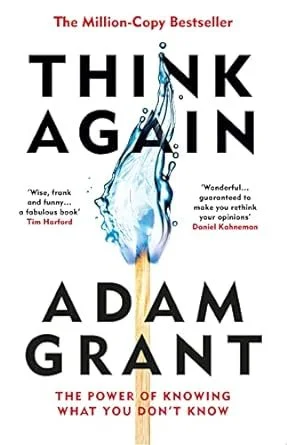Think Again
by George Blackwell
I was struggling to find a journal or relevant piece of research to summarise for this newsletter, so decided to go down a different avenue and discuss one of my favourite books and the influence I found it can have on your attitudes towards training, physiology, and stopping you getting stuck in your ways.
‘Think Again’ by Adam Grant is a book about improving your mental agility, i.e., your ability to rethink your own opinions as new evidence becomes available. Grant discusses how human beings desire a sense of security in what is a very uncertain world. This often leads to strong opinions and fixed views about ‘how the world works’, in order to create a sense of comfort. He goes on to outline that, to succeed in our present-day dynamic world, you need to be actively open minded and try to recognise your own psychological biases.
The most prominent analogy he uses throughout the text is to ‘think like a scientist, not a preacher, prosecutor or politician’ to allow yourself to be open minded to other solutions and challenges to your current way of thinking:
• Don’t think in preacher mode, i.e. stick to 1 “right” viewpoint and act from faith/belief instead of hard facts or evidence.
• Don’t think in prosecutor mode, i.e. attack others’ arguments and refuse to admit mistakes.
• Don’t think in politician mode, i.e. change your view or position to suit the circumstances.
• Do think like a scientist, i.e. be actively open-minded, intentionally challenge your assumptions, knowledge, instincts, and habits (instead of clinging to them).
When reflecting on your own views of training or racing, do you have assumptions that are based on faith or folklore like a ‘preacher’? Do you go into prosecutor mode if you have your views challenged?
These differences are fundamental to why TMR endeavours to stay up to date with the most recent research and evidence based practice, and why we do our best to share this through the newsletter. It’s all about staying objective in the pursuit of the best methods to help you achieve your goals.

